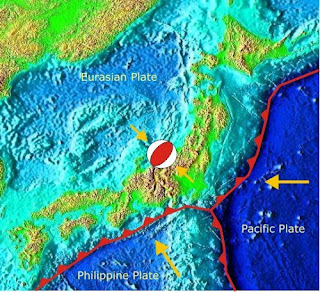Great disasters always want to be understood. When I went to the aid of the people of the Gulf Coast following Katrina I was humbled by the sight of the destruction. It was so much more than what the news could show. It took my breath away. I feel the same way about what has happened in Japan.
Of course my heart aches for the lives that have been lost, the lives that have been shattered by this tragedy. My prayers are for all who have been affected: the people of Japan and all the relief workers who will rush to Northern Japan just as I did to the Gulf Coast. But I refuse to be a part of the questioning that implies that God did this. Theologies of the sort that must hang on God the kind of anthropomorphic motives that God created this disaster belie first, any kind of modern view of science and then attach to God human spite or anger.
It is easy to blame God for such happenings that are rooted in the earth’s core. It is easy to find reasons in our own proclivities for anger, or outrage. But in reality, God has little to do with earthquakes, little to do with tsunamis, and nothing to do with nuclear disasters of reactors save in the building blocks of Creation.
Theologies that entertain such causes for natural disasters are rooted in a pre-modern sense of magic rather than even modernist science. They are rooted in the kind of idealism that came from the Reform theologies of the Swiss who understood that humanity was predestined to certain ends. Now many of the reformed traditions eschew double predestination, but they still cling to an idea that ‘God has a plan’ for you, the Church, the nation, and the world. This kind of theology falters in the light of such disasters unless you are part of the Chicken Little School of Theology who are predicting the end of the world.
The ancients have seen this kind of disaster long before our time. We even have accounts of such upheaval in Hebrew Scripture. What else are the psalms saying when they speak of “hills that skip like lambs” or that the mountains “clap their hands?” They are speaking of the awe that such movements of the earth’s crust produces.
When I looked at the destruction of Katrina, I was in awe of the power of a mere hurricane. Those who experienced the Indian Ocean tsunami were overwhelmed with the suddenness of such power. And those who experienced the earthquakes in Haiti or Christchurch or now in Japan are overwhelmed with the human pain and loss. But none of them can again believe in the security of human existence.
Life is dangerous. Sometimes we can fool ourselves in to kinds of false security. We can think that we have built our houses where hurricanes don’t happen, or there is no fault line. We can believe that some social contracts (i.e. governments or insurance companies) will keep us safe. But in reality, nothing is safe.
There is only one constant: God’s love. To those who have lost much in natural disasters may turn to blame God, but it will be God’s love from those who will help them pick up their lives following these disasters that will make a difference whether they ‘survive’ to live in joy and gratitude again. If possible they will stand in the total mystery of the nature and the awe of its power and be humbled to recognize that there is little or no control that humanity has in the face of such forces. The only saving thing is the incarnate love for humanity that such disasters produce in us who know God’s love. It is this love that brings the outpouring of human goodness that allows people to reach beyond disaster.
The people of Japan have been damaged by earthquakes and tsunamis over and over in their history. The people of the Gulf coast have recovered from hurricanes before. The folks in Haiti have known the poverty and disruption of their nations over and over. The people of Christchurch have known hardship too. What will show God’s real power in the world is whether we who have seen the damage can reach out with assistance and renewal. This is not a glib—‘everything is going to be alright’. It is a real faith in God’s love that spreads out when we are humbled by that which is so far beyond us.
It is not for us to determine what God’s purpose is. It is for us to claim the high calling to embrace those who have been harmed by the forces of nature. It is not for us to name God’s ‘feelings’; it is the Christian’s job to find in the need a way to proclaim God’s hope.




4 comments:
Amen, sistah!
thanks for clarifying the issues. I posted a link on facebook, much to my friends' gratitude.
Wow. Such clarity of the complex. Thank you!
thank you.
Post a Comment